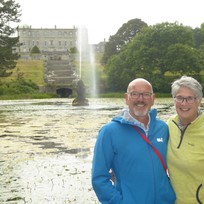( Overview
/ Two Bullocks on a Boat Go West
Dermot, the harbour master collecting his dues. Some consternation and laughter when Kevin thought inflation really has gone mad, and it was €50 rather than €15.
Kevin having a closer look at the alternator, and deciding we need parts we planned a trip into Skibbereen to the chandlery.
Unfortunately the timing of buses into Skibbereen is not great, so we took a taxi, whose driver very kindly drove us via Lough Hyne. Apparently the warmer water temperature makes it popular for swimming and nighttime kayaking. There are also some lovely walks and climbs in the area.
The lake’s small size creates an unusual habitat of highly oxygenated warm seawater that sustains a wide variety of plants and marine life. Differing environments add to the biodiversity, and because of the work of Prof. Renouf and UCC it was designated Europe’s first Marine Nature Reserve in 1981.
Skibbereen Heritage Centre has a film about the history of research at the Lough, and the building of the rapids, but the main exhibition is an interesting, but harrowing one about the Irish Famine. Once again, British Colonial rule fell far short, and most support came from private donations.
When newly-built in 1846, this steam mill became the site of one of the first large scale soup kitchens; a charity soup house which fed up to 8,600 a day. The soup was served free of charge, which was against prevailing policies at the time when the poor had to earn any relief given to them.
Potatoes were a monotonous, but nutritious diet for the Irish (they were taller than their English counterparts) and easily grown in poor soil. When crops had blight for more than one year, people pawned their clothes and fishing nets to buy food, and died from cold and disease as well as starvation
The government also ran soup kitchens, which were a success, but reverted to workhouses as the economy in England struggled with food shortages in Europe. Girls were sent to Australia, and many others emigrated voluntarily, a trend which continues still; Ireland’s population is less than in 1841.
The chandlery and Euro Car Parts didn’t have the fan belt, so we wandered through town, rather liking the look of this place with its cows’ heads, and stopped at Annie Mays for lunch.
After lunch (with Guinness) and an Aldi shop, Declan returned to take us to Evans, a typical, dirty, farm engineering Aladdin’s cave. There two very knowledgable and helpful ladies, who were immaculately dressed and manicured (and Kevin described as glamorous), had just the right part!















 Sign in with Apple
Sign in with Apple  Log in with Facebook
Log in with Facebook